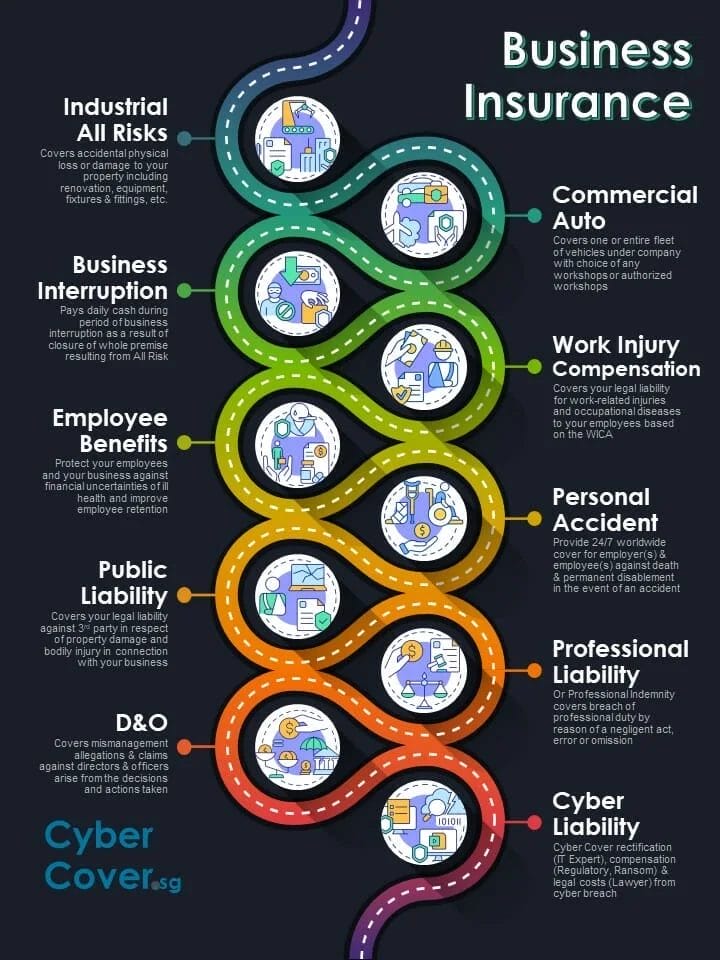
Introduction to Cyber Insurance
In today’s digital age, businesses face an ever-increasing threat of cyber attacks. These attacks can result in significant financial losses, reputational damage, and even legal liabilities. As a result, it has become crucial for businesses, especially small and medium-sized enterprises (SMEs), to protect themselves against these cyber threats. One effective solution that has emerged is cyber insurance.
Cyber insurance is a specialized type of insurance coverage designed to help businesses mitigate the risks associated with cyber attacks and data breaches. It provides financial protection and support in the event of a cyber incident, including coverage for expenses such as legal fees, notification costs, forensic investigations, public relations efforts, and even potential fines or penalties.
The importance of cyber insurance cannot be overstated. With the increasing sophistication and frequency of cyber attacks targeting SMEs in Singapore, having adequate protection is no longer just an option but a necessity. A single breach can have devastating consequences for a business’s bottom line and its reputation.
One of the main reasons why SMEs are particularly vulnerable to cyber threats is their limited resources and expertise in cybersecurity. Unlike large corporations that may have dedicated IT departments or security teams, many SMEs lack the necessary knowledge or financial means to implement robust cybersecurity measures on their own. This makes them attractive targets for hackers who exploit vulnerabilities in their systems.
Furthermore, SMEs often underestimate the potential impact of a cyber attack on their operations. They may assume that they are too small or insignificant to be targeted by hackers. However, this misconception can prove costly as hackers increasingly target smaller businesses precisely because they tend to have weaker security measures in place.
This is where cyber insurance comes into play. By investing in comprehensive cyber insurance coverage tailored to their specific needs, Singapore SMEs can effectively transfer the financial risks associated with cyber attacks to an insurer. In the event of a breach or data loss incident, having cyber insurance can provide much-needed financial support to help businesses recover and minimize the impact on their operations.
Moreover, cyber insurance also offers additional benefits beyond financial protection. Many insurers provide access to a network of cybersecurity experts who can assist SMEs in preventing and responding to cyber incidents. This includes guidance on implementing best practices, conducting risk assessments, and developing incident response plans. By leveraging these resources, SMEs can enhance their overall cybersecurity posture and better protect themselves against future attacks.
Challenges Faced by Singapore SMEs in Cybersecurity
Singapore SMEs face numerous challenges when it comes to cybersecurity. In order to understand these challenges, it is important to have an overview of the cybersecurity landscape in Singapore.
Singapore has positioned itself as a global business hub, attracting multinational companies and startups alike. This has made it a prime target for cybercriminals looking to exploit vulnerabilities in the digital infrastructure. The country’s high connectivity and reliance on technology make it susceptible to cyber threats from both external and internal sources.
One of the main challenges faced by SMEs in Singapore is limited resources. Unlike larger corporations, SMEs often have smaller budgets and fewer dedicated IT personnel. This means they may not have access to the same level of cybersecurity expertise or advanced tools and technologies that larger companies can afford. As a result, they are more vulnerable to cyber attacks.
Another challenge is the lack of awareness and understanding about cybersecurity among SME owners and employees. Many SMEs may not fully comprehend the potential risks associated with cyber threats or the importance of implementing robust security measures. This lack of awareness can lead to complacency and inadequate protection against cyber attacks.
Furthermore, SMEs often struggle with compliance issues related to cybersecurity regulations. Singapore has implemented various laws and regulations aimed at protecting personal data and ensuring cybersecurity best practices. However, SMEs may find it difficult to navigate these complex requirements due to limited resources or lack of knowledge about compliance obligations.
Additionally, the evolving nature of cyber threats presents a constant challenge for SMEs in Singapore. Cybercriminals are constantly adapting their tactics and techniques, making it difficult for businesses to keep up with new vulnerabilities and attack vectors. SMEs may not have access to real-time threat intelligence or proactive monitoring systems, leaving them more susceptible to emerging threats.
Lastly, there is a shortage of skilled cybersecurity professionals in Singapore. The demand for cybersecurity talent far outweighs the supply, resulting in fierce competition for qualified professionals. This shortage makes it challenging for SMEs to recruit or retain cybersecurity experts, further exacerbating their vulnerability to cyber attacks.
Case Study: How Cyber Insurance Helped a Singapore SME
In this case study, we will explore how cyber insurance played a crucial role in helping a Singapore SME mitigate the impact of a cyber attack. The SME in question is a small manufacturing company with around 50 employees. Like many other businesses in Singapore, they were not fully prepared for the sophisticated cyber threats that exist today.
The cyber attack on this SME was initiated through a phishing email sent to one of their employees. Unfortunately, the employee fell victim to the scam and unknowingly provided access to sensitive company information. The attackers then exploited this access to infiltrate the company’s network and gain control over their systems.
Upon discovering the breach, the SME immediately contacted their cyber insurance provider who had been recommended by their IT consultant. This prompt action allowed them to activate their coverage and receive immediate support from cybersecurity experts assigned by the insurance company.
The first step taken by the insurance provider was to conduct a thorough investigation into the extent of the breach and assess the potential damage caused. This involved analyzing log files, reviewing system configurations, and identifying any compromised data or unauthorized access points.
Once the initial assessment was completed, the insurance experts worked closely with the SME’s IT team to contain and eradicate any malware or malicious code that had been introduced into their systems. They also helped strengthen security measures by implementing additional safeguards such as multi-factor authentication and regular vulnerability assessments.
One of the key benefits of having cyber insurance was evident during this incident – financial protection. The costs associated with recovering from a cyber attack can be significant for any business, especially for SMEs with limited resources. However, thanks to their insurance coverage, this SME did not have to bear these costs alone.
The insurance policy covered expenses related to forensic investigations, legal fees, public relations efforts to manage reputation damage, and even potential loss of business income due to disrupted operations. This financial support allowed them to focus on getting back on track without worrying about bankruptcy or severe financial strain.
Furthermore, the insurance provider offered assistance in meeting regulatory requirements and complying with data breach notification laws. This was particularly crucial for the SME as they had customers’ personal information stored in their systems. The insurance experts guided them through the process of notifying affected individuals and authorities, ensuring compliance and minimizing potential legal repercussions.
Beyond financial protection, cyber insurance also helped this SME rebuild customer trust and confidence. In the aftermath of a cyber attack, businesses often face reputational damage that can result in customer attrition. However, with the support of their insurance provider, the SME was able to swiftly communicate with their customers, reassuring them about the steps taken to address the breach and enhance security measures.
The incident served as a wake-up call for this Singapore SME and highlighted the importance of proactive cybersecurity measures. They realized that relying solely on traditional IT security solutions was not sufficient in today’s evolving threat landscape. As a result, they proactively invested in employee training programs to educate their staff about phishing scams and other common cyber threats.
Benefits of Cyber Insurance for Singapore SMEs
Cyber insurance offers numerous benefits for Singapore SMEs, providing financial protection and peace of mind in the face of increasing cyber threats. In this section, we will explore the advantages that cyber insurance brings to Singapore SMEs and how it can safeguard businesses against cyber attacks.
Financial Protection against Cyber Attacks
One of the primary benefits of cyber insurance is its ability to provide financial protection to Singapore SMEs in the event of a cyber attack. Cyber attacks can result in significant financial losses, including costs associated with forensic investigations, data recovery, legal fees, and potential lawsuits. With cyber insurance coverage, SMEs can transfer these financial risks to an insurer, ensuring that they are not burdened with exorbitant expenses that could potentially bankrupt their business.
Moreover, cyber insurance policies often include coverage for business interruption losses. This means that if a cyber attack disrupts normal business operations and leads to a loss of revenue, the SME can be compensated for the income they would have earned during the downtime. This financial support allows SMEs to recover more quickly from an attack and resume normal operations without suffering long-term financial setbacks.
Coverage for Legal Expenses and Regulatory Fines
In addition to financial protection against direct losses from a cyber attack, cyber insurance also provides coverage for legal expenses and regulatory fines that may arise as a result of a data breach or other cybersecurity incident. Data breaches often lead to lawsuits filed by affected customers or clients seeking compensation for damages resulting from the breach. The cost of defending against these lawsuits can be substantial, especially for small businesses with limited resources.
Furthermore, with the implementation of data protection regulations such as the Personal Data Protection Act (PDPA) in Singapore, non-compliance can result in hefty fines imposed by regulatory authorities. Cyber insurance policies typically cover these fines and penalties, relieving SMEs from bearing these costs themselves. By having adequate coverage in place, SMEs can focus on resolving any legal issues that arise from a cyber attack without the fear of financial ruin.
Assistance with Incident Response and Recovery
In the aftermath of a cyber attack, SMEs often struggle to respond effectively and recover from the incident. Cyber insurance can play a crucial role in providing assistance during this critical phase. Many cyber insurance policies offer access to a network of experts who specialize in incident response and recovery. These professionals can help SMEs navigate through the complexities of managing a cyber attack, including conducting forensic investigations, restoring compromised systems, and implementing security measures to prevent future incidents.
Furthermore, cyber insurance policies may cover the costs associated with notifying affected customers or clients about the breach and providing credit monitoring services to mitigate potential identity theft risks. This proactive approach not only helps SMEs fulfill their legal obligations but also demonstrates their commitment to protecting their customers’ interests. By leveraging the expertise and resources provided by cyber insurance, Singapore SMEs can minimize the impact of a cyber attack and expedite their recovery process.
Enhanced Reputation and Customer Trust
In today’s digital age, maintaining a strong reputation is vital for businesses of all sizes. A single data breach or cybersecurity incident can severely damage an SME’s reputation, leading to loss of customer trust and potential business opportunities. Cyber insurance can help SMEs safeguard their reputation by enabling them to respond swiftly and effectively in the event of an attack.
By having cyber insurance coverage in place, SMEs demonstrate their commitment to cybersecurity best practices and risk management. This proactive approach not only reassures existing customers that their data is protected but also instills confidence in potential clients who are increasingly concerned about cybersecurity when choosing business partners. The peace of mind that comes with knowing an SME has taken steps to protect against cyber threats can be a significant competitive advantage in today’s interconnected business landscape.
Recommendations for Leveraging Cyber Insurance Effectively
When it comes to protecting your Singapore SME against cyber threats, having a comprehensive cyber insurance policy in place is essential. However, simply purchasing a policy is not enough. To truly leverage the benefits of cyber insurance, there are several key recommendations that SMEs should consider.
Factors to Consider When Choosing a Cyber Insurance Policy
First and foremost, it is crucial for Singapore SMEs to carefully evaluate and compare different cyber insurance policies before making a decision. Not all policies are created equal, and it is important to choose one that aligns with your specific business needs and risk profile. Consider factors such as coverage limits, deductibles, exclusions, and the reputation of the insurance provider. Engage with an experienced insurance broker who specializes in cyber insurance to ensure you make an informed decision.
Best Practices for Implementing Cyber Insurance within an SME
Once you have selected a suitable cyber insurance policy, it is important to implement it effectively within your SME. This involves taking proactive steps to enhance your cybersecurity posture and reduce the likelihood of a successful cyber attack. Some best practices include:
-
Conducting regular cybersecurity assessments: Regularly assess your IT systems, networks, and infrastructure for vulnerabilities or weaknesses that could be exploited by hackers.
-
Employee training and awareness programs: Educate your employees about cybersecurity best practices such as strong password management, identifying phishing emails, and reporting suspicious activities.
-
Implementing robust security measures: Install firewalls, antivirus software, intrusion detection systems, and other security tools to protect your digital assets from unauthorized access.
-
Data backup and recovery plans: Regularly back up critical data and develop comprehensive disaster recovery plans to minimize downtime in case of a breach or system failure.
Importance of Regular Policy Review and Updates
Cyber threats are constantly evolving, which means your cybersecurity strategy must also evolve over time. It is crucial for Singapore SMEs to regularly review and update their cyber insurance policies to ensure they remain effective in mitigating emerging risks. This includes staying informed about the latest cyber threats, understanding any changes in your business operations or IT infrastructure, and communicating these updates to your insurance provider. By maintaining an open line of communication with your insurer, you can ensure that your policy remains up-to-date and provides adequate coverage for your evolving needs.
In conclusion, cyber insurance is a valuable tool for Singapore SMEs to protect themselves against the ever-increasing threat of cyber attacks. By carefully selecting a suitable policy, implementing robust cybersecurity measures, and regularly reviewing and updating their policies, SMEs can effectively leverage the benefits of cyber insurance. Remember that cyber insurance should be seen as part of a comprehensive cybersecurity strategy, alongside other preventive measures such as employee training and network security enhancements. By taking a proactive approach to cybersecurity and leveraging the expertise of reputable insurers, Singapore SMEs can safeguard their businesses and mitigate potential financial losses resulting from cyber incidents. Don’t wait until it’s too late – invest in cyber insurance today to secure your SME’s future.





